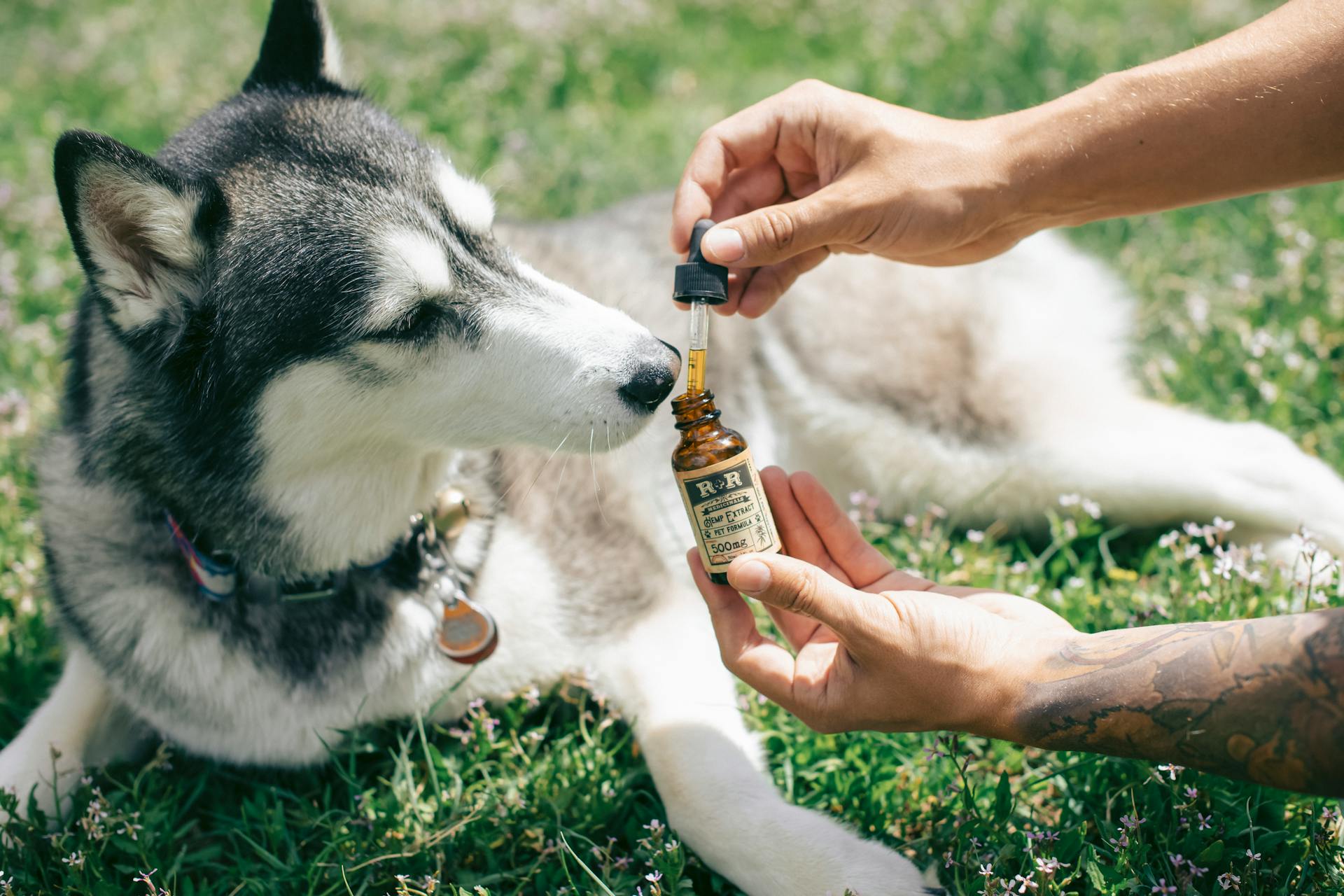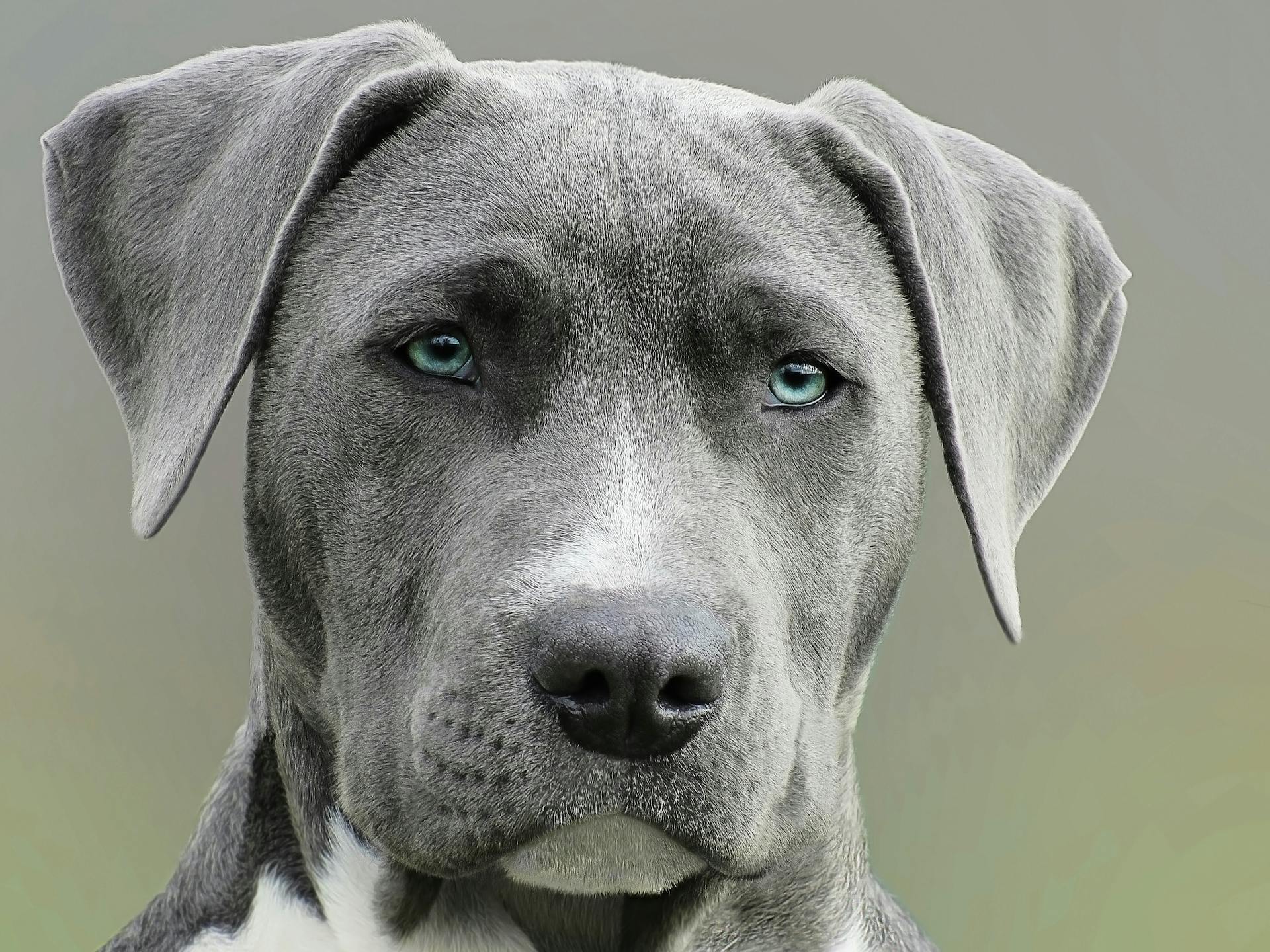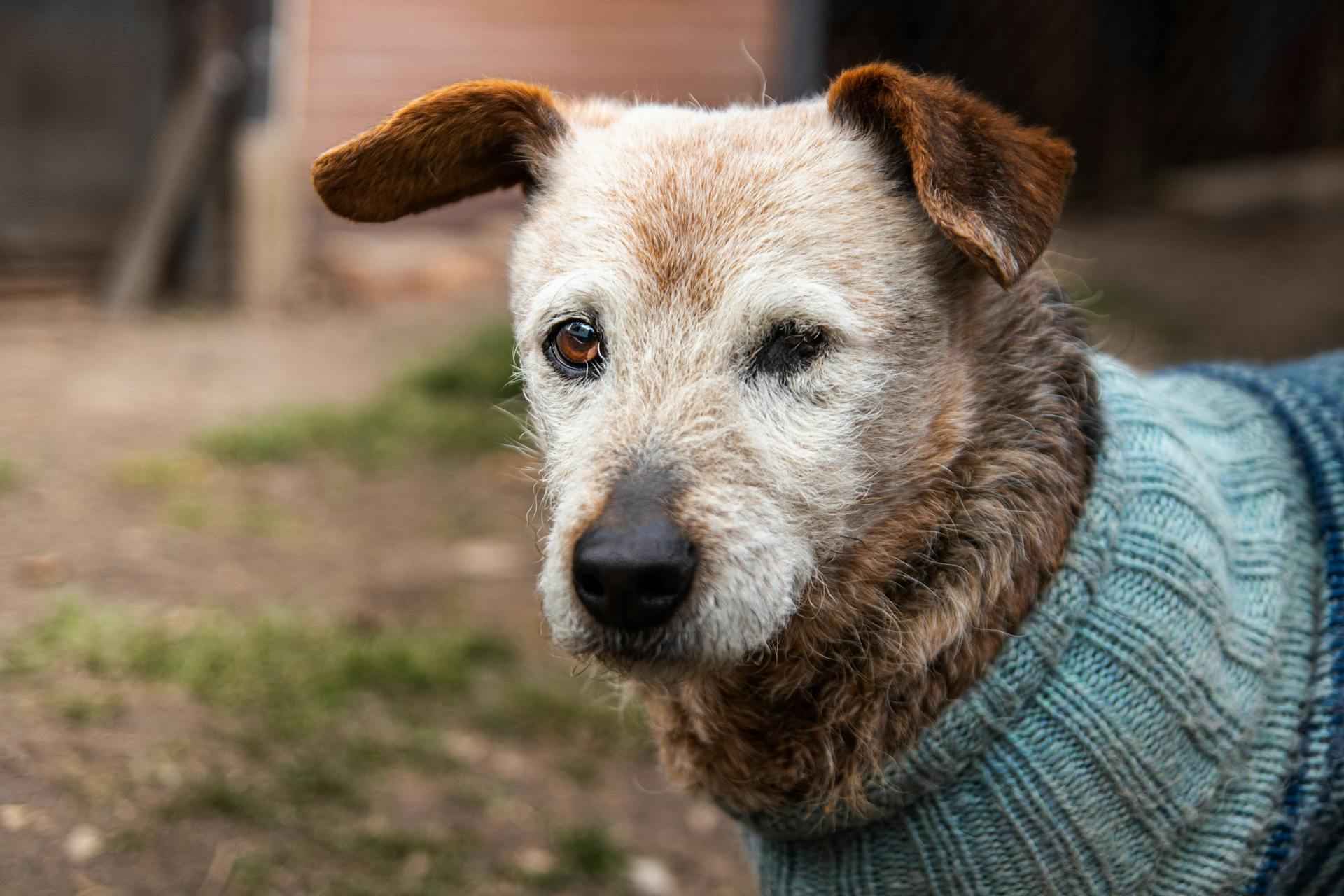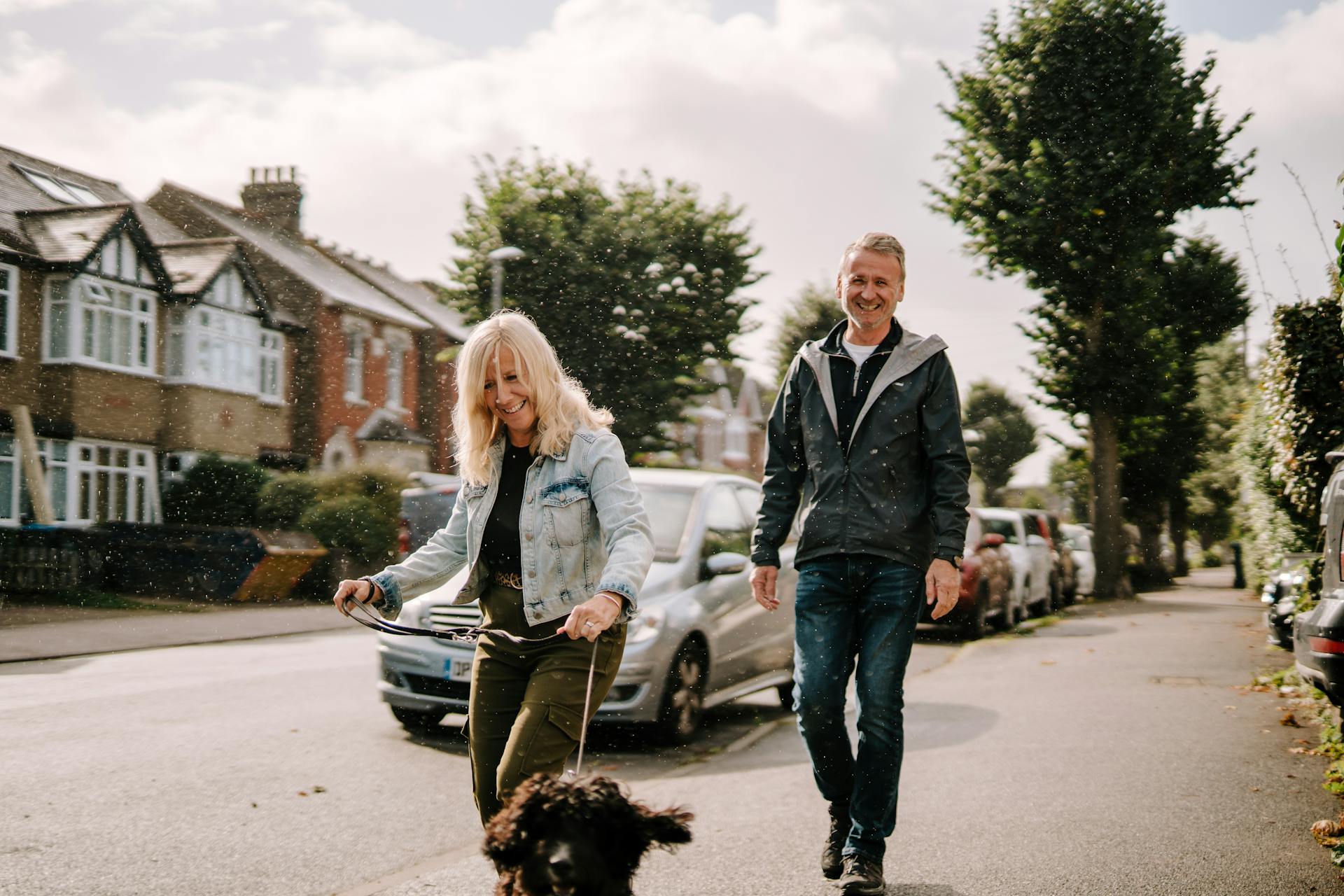
Dog dementia supplements can be a valuable tool in managing your furry friend's condition. Research suggests that certain supplements can help slow down cognitive decline in dogs with dementia.
Omega-3 fatty acids have been shown to have a positive impact on brain health in dogs. They can be found in fish oil supplements.
Some supplements, like B vitamins, may help improve cognitive function in dogs. B vitamins are essential for brain health and can be found in food or taken as a supplement.
A well-balanced diet that includes essential nutrients is crucial for maintaining your dog's overall health. A combination of omega-3 fatty acids and B vitamins may provide the best results.
Consider reading: Certificate of Good Health Dog
Diagnosis and Treatment
Diagnosis of dog dementia involves a process of elimination to rule out other potential medical issues. Your veterinarian will run a number of tests, including a physical examination, routine blood tests, thyroid testing, ultrasounds, and X-rays to rule out other illnesses.
They may also recommend more advanced imaging, such as a CT scan or MRI. It's essential to take your dog to the veterinarian as soon as you notice any of the potential symptoms of CCD, as the earlier your dog is diagnosed, the better you can manage their symptoms.
A veterinarian will evaluate your dog periodically to monitor their response to therapy and the progression of symptoms. If you notice any behavioral changes in your dog, notify your vet immediately, as in geriatric dogs, any change can be serious.
Treatment for CCD involves a combination of managing behavior and environment, enhanced diet, and medication. Your veterinarian may recommend prescription diets for brain health, such as Hills' b/d, Royal Canin's Mature Consult, and Purina Pro Plan's Neurocare.
Some dogs benefit from anti-anxiety medications if anxiety-related symptoms are a major factor of their CCD. Your veterinarian will help you determine the best course of treatment for your dog.
Here are some treatment options for CCD:
- Prescription diets for brain health
- Anti-anxiety medications
- Medications such as selegiline (Anipryl) and propentofylline
- Supplements such as omega fatty acids, melatonin, and s-adenosylmethionine (sam-e)
How Veterinarians Diagnose
Diagnosing canine dementia is a process of elimination, where veterinarians rule out other potential medical issues before making a diagnosis.
Your veterinarian will need a thorough history of your dog's health, including the onset and nature of symptoms, to understand the situation.
Routine blood tests, thyroid testing, ultrasounds, and X-rays are used to rule out other diseases that may cause behavioral changes associated with canine cognitive dysfunction syndrome.
A physical examination is also performed to evaluate your dog's overall health status and cognitive functions.
Veterinarians may recommend advanced imaging like an MRI or CT scan to get a clearer picture of your dog's condition.
The earlier your dog is diagnosed, the better you can manage their symptoms of canine dementia.
Taking your dog to the veterinarian as soon as you notice any potential symptoms of CCD is crucial.
Intriguing read: Dog Health News
How Is Treated?
Treating dog dementia requires a multi-faceted approach that involves managing behavior and environment, enhanced diet, and medication. A daily routine of exercise, play, and mental stimulation can help slow the progression of cognitive decline.

Maintaining a strict routine, especially at bedtime, can help minimize symptoms of canine cognitive dysfunction syndrome. This can include a consistent sleep schedule and a safe sleeping environment, such as an orthopedic foam bed with a washable cover.
Night lights can help your senior dog navigate in the dark, and potty pads near doors can give your pup a place to go if they can't make it until you come home or wake up. Your veterinarian may also suggest employing a special, balanced diet to improve your dog's cognitive function.
Prescription diets for brain health, such as Hills' b/d, Royal Canin's Mature Consult, and Purina Pro Plan's Neurocare, are rich in antioxidants and other nutrients that can improve cognitive function. Additional supplementation of omega fatty acids can also be beneficial.
Medications like Anipryl (selegiline) can help improve brain function by reducing the breakdown of dopamine and other neurotransmitters. Anti-anxiety medications may also be prescribed if anxiety-related symptoms are a major factor of your dog's CCD.
Here are some ways to make your home more accessible and safer for your senior dog:
- Making your home more predictable and pet-proofed can help reduce stress and anxiety.
- Providing adequate toileting opportunities is essential, as old dogs can't "hold it" as they did when they were younger.
- Using a wagon or stroller can help if your dog can't walk anymore.
- Diapers, pads, and waterproof bed and furniture covers can be helpful in managing accidents.
Regular check-ups with your veterinarian are crucial to monitor your dog's response to therapy and the progression of symptoms. If you notice any behavioral changes in your dog, notify your vet immediately, as any change can be serious in geriatric dogs.
Symptoms and Effects
Disorientation can be a sign of dog dementia, where your dog wanders around like they're lost or forgets where they're going.
Your dog might stare into space, almost as if they're staring into the wall, even in a house they've lived in for years.
Behavioral changes are another symptom, such as not recognizing known family members or forgetting daily routines.
A lack of interest in exercise or increased restlessness can also be signs of cognitive decline.
House soiling can occur due to memory loss, and your dog's sleep patterns may change, with pacing around the house at night or sleeping more during the day.
Here are some common symptoms of dog dementia:
- Disorientation: wandering around like they're lost or forgetting where they're going
- Behavioral changes: not recognizing known family members or forgetting daily routines
- Lack of interest in exercise or increased restlessness
- House soiling: due to memory loss
- Disruptions in the sleep-wake cycle: pacing around the house at night or sleeping more during the day
Signs of Dementia
As we explore the world of canine dementia, it's essential to recognize the signs that may indicate your furry friend is struggling with this condition. Disorientation and confusion are common symptoms, where your dog may wander around like they're lost or stare into space, forgetting familiar places.
Changes in behavior and social interactions are also telltale signs. Your dog may not recognize known family members, forget their daily walking path, or lack an appetite. This can be due to a decline in their mental state, making it challenging for them to navigate their surroundings.
Pacing back and forth or in circles, often turning consistently in one direction, is another sign of dementia in dogs. They may also get lost in familiar places or wait at the "hinge" side of the door to go out, indicating a loss of spatial awareness.
House soiling is a common issue, as your dog's memory loss affects their ability to remember where to go to the bathroom. Disruptions in the sleep-wake cycle are also common, with your dog pacing around the house at night or sleeping more during the day.
Here are some of the most common signs of dementia in dogs:
- Disorientation and confusion
- Pacing back and forth or in circles
- Getting lost in familiar places
- House soiling
- Disruptions in the sleep-wake cycle
- Changes in behavior and social interactions
- Loss of appetite
- Increased anxiety and restlessness
It's essential to note that these symptoms can mimic other health problems and diseases, so it's crucial to consult with your veterinarian to rule out other disorders before diagnosing cognitive decline.
Causes

As dogs age, their brains undergo significant changes that can lead to canine dementia. The brain atrophies, meaning cells die, especially in the portion responsible for learning and memory.
This process affects the brain's ability to process information and transmit signals. The cerebral cortex, which is responsible for learning and memory, is especially vulnerable to cell death.
Dogs with canine dementia have an abnormal protein called beta amyloid building up in their brains. This protein buildup causes decreased nerve signaling in the brain.
In dogs with CCD, neurotransmitters, which help the brain send signals, are degraded by high levels of a compound called monoamine oxidase B (MAOB). This further contributes to the brain's decline.
Dogs with epilepsy and those that lead a sedentary lifestyle are at a higher risk for developing canine dementia.
A unique perspective: Protein in Female Dog Urine
Supplements
Supplements can play a significant role in managing dog dementia symptoms. SAMe (S-adenosylmethionine) has proven effective in staving off canine cognitive dysfunction (CCD) and moderating its symptoms.
Antioxidant nutritional supplements such as Denamarin, silybin, vitamin E, Cholodin, and omega-3 fatty acids can be added to any diet. These supplements can help reduce the severity of CCD symptoms.
Solliquin, which contains an amino acid that can reduce CCD-related anxiety, is another supplement option. However, it's essential to talk to your vet before adding any supplements to your dog's diet.
Some supplements that may benefit your dog include melatonin, additional vitamin B, and s-adenosylmethionine (sam-e). Omega fatty acids can also be extremely beneficial to dogs with CCD.
Here are some supplements to consider:
- SAMe (S-adenosylmethionine)
- Denamarin
- Silybin
- Vitamin E
- Cholodin
- Omega-3 fatty acids
- Solliquin
- Melatonin
- Additional vitamin B
- S-adenosylmethionine (sam-e)
- Omega fatty acids
Remember to consult with your veterinarian before adding any supplements to your dog's diet.
Care and Management
It's essential to recognize that canine dementia is a progressive disease, and there's no cure. However, with the right care and management, you can slow its progression and improve your dog's quality of life.
Maintaining a steady routine is crucial for managing cognitive impairment in older dogs. This includes regular walks, meals, and playtime at the same time every day. Exercise is also vital, so consider hiring a dog-walking service if you're short on time.
To create a comfortable environment, avoid rearranging furniture or making other changes that might confuse your dog. Instead, stick to familiar surroundings and provide plenty of cuddle time to reassure your dog that you're there to support them.
If your dog is experiencing anxiety or restlessness, anti-anxiety medications may be necessary. Your veterinarian can help you determine the best course of action.
Lifestyle Management
Keeping your dog's routine steady is key to managing cognitive impairment in older or geriatric dogs. This can be as simple as having them go on walks, eat meals, and play at the same time every day.
Exercise is essential for your dog's brain health. Daily walks and play sessions are a must, and it's not just physical exercise that's beneficial - mentally stimulating activities like teaching tricks and playing games like puzzle games or hide-and-seek can also help.
Puzzle games are a great way to exercise your dog's brain, as they force your dog to work out a problem to get a treat. Hide-and-seek can also help improve your dog's spatial awareness.
Check this out: Skin Relief for Dogs with Allergies
A steady routine can also help reduce anxiety in dogs. Avoid making changes to your dog's physical environment, such as rearranging furniture, as this can confuse them even more.
It's also essential to provide plenty of cuddle time to comfort and reassure your dog. Never punish your dog or get angry when they're displaying signs of cognitive decline, as this can only confuse and scare them further.
Here's a simple table to help you keep track of your dog's daily routine:
By following this simple routine and providing plenty of exercise, mental stimulation, and cuddle time, you can help manage your dog's cognitive impairment and improve their overall quality of life.
Life Expectancy
Life expectancy can be a tricky prognosis to make for dogs with dementia, as it's a degenerative process that occurs in a dog's senior years.
Since canine cognitive dysfunction is similar to Alzheimer's in humans, there isn't a specific timeframe established for how long a dog with dementia will live.
Working with your veterinarian to track your dog's quality of life is crucial, as it will help you determine when your dog is letting you know it's time.
A dog's quality of life will ultimately dictate how long they live with dementia, making regular monitoring with your vet essential.
You might enjoy: Canine Mouth Cancer Life Expectancy
Frequently Asked Questions
What are the three stages of dog dementia?
Dogs with dementia progress through three stages: mild, moderate, and severe, each with distinct symptoms and levels of impact on daily life. Understanding these stages is crucial for early detection and effective management of canine dementia.
How to calm down a dog with dementia?
Establish a consistent daily routine, including regular sleep schedules, walks, and feeding times, to help reduce anxiety and confusion in dogs with dementia
Sources
- https://www.petmd.com/dog/conditions/neurological/dog-dementia
- https://www.thewildest.com/dog-health/canine-dementia-signs-symptoms-treatments
- https://cbddoghealth.com/can-cbd-oil-help-dogs-with-dementia-or-ccd/
- https://www.dogster.com/ask-the-vet/dementia-in-dogs
- https://nativepet.com/blogs/health/dog-dementia
Featured Images: pexels.com


